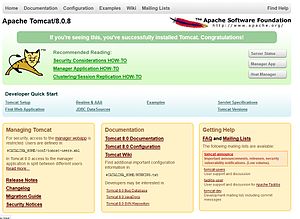Tomcat Catalina
 |
|

Apache Tomcat Default Page
|
|
| Developer(s) | Apache Software Foundation |
|---|---|
| Initial release | 1999 |
| Stable release | 8.5.15 (May 5, 2017 ) |
| Preview release | 9.0.0.M21 (alpha) (May 4, 2017 ) |
| Repository | svn |
| Written in | Java |
| Type |
Servlet container web server |
| License | Apache License 2.0 |
| Website | tomcat |
Apache Tomcat, often referred to as Tomcat Server, is an open-source Java Servlet Container developed by the Apache Software Foundation (ASF). Tomcat implements several Java EE specifications including Java Servlet, JavaServer Pages (JSP), Java EL, and WebSocket, and provides a "pure Java" web server environment in which Java code can run.
Tomcat is developed and maintained by an open community of developers under the auspices of the Apache Software Foundation, released under the Apache License 2.0 license, and is open-source software.
Tomcat 4.x was released with Catalina (a servlet container), Coyote (an HTTP connector) and Jasper (a JSP engine).
Catalina is Tomcat's servlet container. Catalina implements Sun Microsystems's specifications for servlet and JavaServer Pages (JSP). In Tomcat, a Realm element represents a "database" of usernames, passwords, and roles (similar to Unix groups) assigned to those users. Different implementations of Realm allow Catalina to be integrated into environments where such authentication information is already being created and maintained, and then use that information to implement Container Managed Security as described in the Servlet Specification.
Coyote is a Connector component for Tomcat that supports the HTTP 1.1 protocol as a web server. This allows Catalina, nominally a Java Servlet or JSP container, to also act as a plain web server that serves local files as HTTP documents.
Coyote listens for incoming connections to the server on a specific port and forwards the request to the Tomcat Engine to process the request and send back a response to the requesting client. Another Coyote Connector, Coyote JK, listens similarly but instead forwards its requests to another web server, such as Apache, using the . This usually offers better performance.
...
Wikipedia
